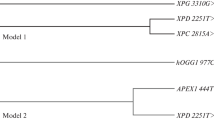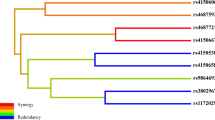Abstract
Lung adenocarcinoma (ADC) is one of the major histological types of lung cancer. Genetic polymorphism in DNA repair genes and lung ADC susceptibility is well documented. In this case–control study, the association between the polymorphic sites of DNA repair genes XPD-751, XRCC1-399, and OGG1-326, and lung ADC susceptibility in ethnic Han Chinese population has been investigated. Genomic DNA was isolated from the peripheral blood of 201 healthy controls and 82 lung ADC patients from the people of Hunan Province, China. Polymorphisms of the investigated genes were analyzed by using polymerase chain reaction–restriction fragment length polymorphism. There was no significant difference between the samples from lung ADC patients and healthy controls about the genotype frequencies of XPD-751, XRCC1-399, and OGG1-326 sites. However, multifactor dimensionality reduction analysis showed that the genetic polymorphisms of the three-loci models of DNA repair genes (XPD-751/XRCC1-399/OGG1-326) are associated with lung ADC. Thus, this study reveals that a three-order interaction among the polymorphic sites of XPD-751, XRCC1-399, and OGG1-326 is associated with lung ADC risk in the studied population, although polymorphism in individual gene was not associated.



Similar content being viewed by others
References
Jemal A, Bray F, Center MM, Ferlay J, Ward E, Forman D. Global cancer statistics. CA Cancer J Clin. 2011;61:69–90.
Travis W, Nicholson S, Hirsch FR, et al. Tumors of the lung. In: Travis D, Brambilla E, Muller-Hermelink HK, Harris CC, editors. World Health Organization classification of tumors: pathology and genetics, tumours of lung, pleura, thymus and heart. Lyon: IARC; 2004. p. 31–4.
Oliveira C, Seruca R, Carneiro F. Genetics, pathology, and clinics of familial gastric cancer. Int J Surg Pathol. 2006;14:21–33.
Maynard S, Schurman SH, Harboe C, de Souza-Pinto NC, Bohr VA. Base excision repair of oxidative DNA damage and association with cancer and aging. Carcinogenesis. 2009;30:2–10.
Shen H, Spitz MR, Qiao Y, et al. Smoking, DNA repair capacity and risk of non-small cell lung cancer. Int J Cancer. 2003;107:84–8.
Dai L, Duan F, Wang P, Song C, Wang K, Zhang J. XRCC1 gene polymorphisms and lung cancer susceptibility: a meta-analysis of 44 case–control studies. Mol Biol Rep. 2012;39:9535–47.
Kazma R, Babron MC, Gaborieau V, et al. Lung cancer and DNA repair genes: multilevel association analysis from the International Lung Cancer Consortium. Carcinogenesis. 2012;33:1059–64.
Hakem R. DNA-damage repair; the good, the bad, and the ugly. EMBO J. 2008;27:589–605.
Xi T, Jones IM, Mohrenweiser HW. Many amino acid substitution variants identified in DNA repair genes during human population screenings are predicted to impact protein function. Genomics. 2004;83:970–9.
Coin F, Marinoni JC, Rodolfo C, Fribourg S, Pedrini AM, Egly JM. Mutations in the XPD helicase gene result in XP and TTD phenotypes, preventing interaction between XPD and the p44 subunit of TFIIH. Nat Genet. 1998;20:184–8.
Hemminki K, Xu G, Angelini S, et al. XPD exon 10 and 23 poly-morphisms and DNA repair in human skin in situ. Carcinogenesis. 2001;22:1185–8.
Thompson LH, West MG. XRRC1 keeps DNA from getting stranded. Mutat Res. 2000;59:1–18.
Hung RJ, Hall J, Brennan P, Boffetta P. Genetic polymorphisms in the base excision repair pathway and cancer risk: a HuGE review. Am J Epidemiol. 2005;162:925–42.
Shinmura K, Yokota J. The OGG1 gene encodes a repair enzyme for oxidatively damaged DNA and is involved in human carcinogenesis. Antioxid Redox Signal. 2001;3:597–609.
Kohno T, Shinmura K, Tosaka M, et al. Genetic polymorphisms and alternative splicing of the hOGG1 gene, that is involved in the repair of 8-hydroxyguanine in damaged DNA. Oncogene. 1998;16:3219–25.
Wilson 3rd DM, Kim D, Berquist BR, Sigurdson AJ. Variation in base excision repair capacity. Mutat Res. 2011;711:100–12.
Kim JI, Park YJ, Kim KH, et al. hOGG1 Ser326Cys polymorphism modifies the significance of the environmental risk factor for colon cancer. World J Gastroenterol. 2003;9:956–60.
Davis LG, Dibner MD, Battey JF. Preparation of DNA from eukaryotic cells. In: Basic methods in molecular biology. New York: Elsevier; 1986. p. 42–50.
Li Z, Guan W, Li MX, et al. Genetic polymorphism of DNA base-excision repair genes (APE1, OGG1 and XRCC1) and their correlation with risk of lung cancer in a Chinese population. Arch Med Res. 2011;42:226–34.
Khan MA, Tania M, Zhang DZ, Chen HC. Antioxidant enzymes and cancer. Chin J Cancer Res. 2010;22:87–92.
Mohrenweiser HW, Jones IM. Variation in DNA repair is a factor in cancer susceptibility: a paradigm for promises and perils of individual and population risk estimation? Mutat Res. 1998;400:15–24.
Xing DY, Qi J, Tan W, et al. Association of genetic polymorphisms in the DNA repair gene XPD with risk of lung and esophageal cancer in a Chinese population in Beijing. Chin J Med Genet. 2003;20:35–8.
Hou SM, Fält S, Angelini S, et al. The XPD variant alleles are associated with increased aromatic DNA adduct level and lung cancer risk. Carcinogenesis. 2002;23:599–603.
Vogel U, Laros I, Jacobsen NR, et al. Two regions in chromosome 19q13.2-3 are associated with risk of lung cancer. Mutat Res. 2004;546:65–74.
Divine KK, Gilliland FD, Crowell RE, et al. The XRCC1399glutamine allele is a risk factor for adenocarcinoma of the lung. Mutat Res. 2001;461:273–8.
Li MC, Cui ZS, He QC, Zhou BS. Association of genetic polymorphism in the DNA repair gene XRCC1 with susceptibility to lung cancer in non-smoking women. Zhonghua Zhong Liu Za Zhi. 2005;27:713–6.
Yin J, Vogel U, Ma Y, Qi R, Sun Z, Wang H. The DNA repair gene XRCC1 and genetic susceptibility of lung cancer in a northeastern Chinese population. Lung Cancer. 2007;56:153–60.
Zhang X, Miao X, Liang G, et al. Polymorphisms in DNA base excision repair genes ADPRT and XRCC1 and risk of lung cancer. Cancer Res. 2005;65:722–6.
Sugimura H, Kohno T, Wakai K, et al. hOGG1 Ser326Cys polymorphism and lung cancer susceptibility. Cancer Epidemiol Biomarkers Prev. 1999;8:669–74.
Ito H, Hamajima N, Takezaki T, et al. A limited association of OGG1 Ser326Cys polymorphism for adenocarcinoma of the lung. J Epidemiol. 2002;12:258–65.
Kohno T, Kunitoh H, Toyama K, et al. Association of the OGG1-Ser326Cys polymorphism with lung adenocarcinoma risk. Cancer Sci. 2006;97:724–8.
Park J, Chen L, Tockman MS, Elahi A, Lazarus P. The human 8-oxoguanine DNA N-glycosylase 1 (hOGG1) DNA repair enzyme and its association with lung cancer risk. Pharmacogenetics. 2004;14:103–9.
López-Cima MF, González-Arriaga P, García-Castro L, et al. Polymorphisms in XPC, XPD, XRCC1, and XRCC3 DNA repair genes and lung cancer risk in a population of northern Spain. BMC Cancer. 2007;7:162.
Palli D, Polidoro S, D’Errico M, et al. Polymorphic DNA repair and metabolic genes: a multigenic study on gastric cancer. Mutagenesis. 2010;25:569–75.
Zhang Y, Zhang L, Song Z, et al. Genetic polymorphisms in DNA repair genes OGG1, APE1, XRCC1, and XPD and the risk of age-related cataract. Ophthalmology. 2012;119:900–6.
Acknowledgments
The work was supported by the National Basic Research Program of China (grant no. 2011CB910700, branch no. 2011CB910704).
Conflicts of interest
None
Author information
Authors and Affiliations
Corresponding author
Additional information
Fang-dan Ouyang and Fu-lan Yang contributed equally to this work.
Rights and permissions
About this article
Cite this article
Ouyang, Fd., Yang, Fl., Chen, Hc. et al. Polymorphisms of DNA repair genes XPD, XRCC1, and OGG1, and lung adenocarcinoma susceptibility in Chinese population. Tumor Biol. 34, 2843–2848 (2013). https://doi.org/10.1007/s13277-013-0844-6
Received:
Accepted:
Published:
Issue Date:
DOI: https://doi.org/10.1007/s13277-013-0844-6




